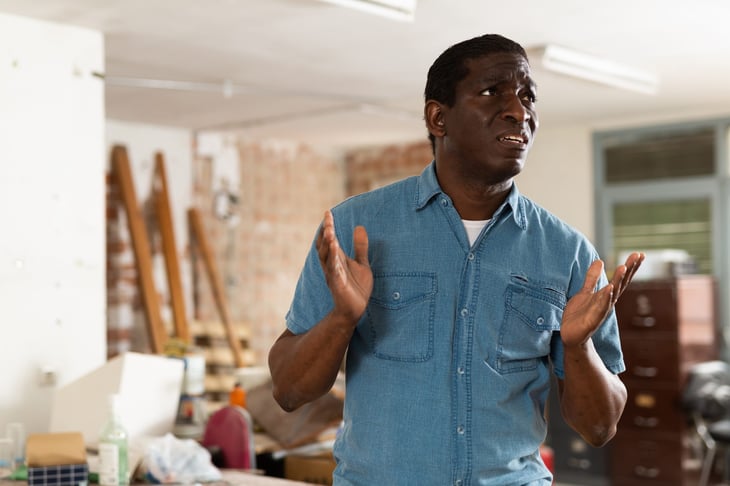
Editor's Note: This story originally appeared on Point2.
Buying your first home is a fantastic achievement and brings much excitement. However, the stakes are high, and any misstep can soon become costly.
To help with this, we compiled a list of some of the most common mistakes you need to avoid as a first-time homebuyer. Check it out.
1. Not Getting Mortgage Pre-Approval

During the pre-approval process, lenders will review various financial information, such as your credit report, income and tax history. With that data, they’ll let you know the maximum loan amount you qualify for.
Armed with this figure, you can then search for homes within your budget.
As a bonus, pre-approved buyers are always much more popular with sellers, as it shows you’re serious about buying.
2. Not Shopping Around for a Lender

Many buyers typically stick with their current bank or the first lender they speak to when seeking a mortgage. However, it’s well worth taking the time to shop around for the best deals.
There are a great many mortgage lenders that are worth investigating, and you may find far better rates than your bank offers.
3. Down Payment Confusion

Many buyers are fixated on the idea that they must put down a 20% down payment on any home they wish to purchase. As a result, they put off buying a home until they’ve saved this considerable chunk of cash.
But, while it’s true that a 20% down payment will save you from paying mortgage insurance, there’s certainly no obligation to pay so much.
In fact, you can often put down as little as 3.5%. Of course, the higher your down payment is, the lower your monthly repayments will be.
The most important thing is to find the right balance for your circumstances.
4. Not Budgeting for Closing Costs

Buying a home is a complicated transaction, and there are many more costs besides the down payment and monthly mortgage payments to consider:
- Home inspection
- Agent fees
- Legal fees
- Home insurance
- Mortgage insurance
- Taxes
- Maintenance
- Utility and service hookups
- Moving costs
Forgetting to account for these costs can cost you thousands of dollars and leave you struggling to pay off your repayments.
5. Taking Your Eye Off Your Credit Report

Once pre-approved for a mortgage, you might think you can relax regarding your credit. However, lenders will conduct further credit checks before officially underwriting your loan.
If you haven’t taken care of your credit in the interim, you can easily fall at the last hurdle, losing out on your dream home and any cash you’ve already paid out.
The easiest way to avoid this mistake is to maintain the status quo. Don’t take out any new lines of credit or close existing ones.
The main thing is to ensure your debt-to-income ratio remains the same.
6. Taking a New Job

Continuing from the previous point, it’s best to avoid changing your new job when buying a house.
Lenders typically want to see two years’ proof of stable income and will generally pre-approve your loan based on this information. If, in the meantime, you change your employer, the previous offer may be invalidated.
If you know you have to change your job, be sure to tell your lender this right at the beginning.
7. Going All In

Many first-time buyers are prepared to put all they have into buying their first home just to get a foot on the property ladder.
However, this is a big no-no. It’s essential to keep some cash aside in case of unexpected costs, like emergency repairs.
Without a safety cushion, you can soon find yourself struggling to keep up with repayments and, in extreme cases, may be forced to foreclose and lose your home.
8. Not Knowing Your Options

It’s well worth seeing if you qualify for one of the many first-time buyer schemes available to new homeowners.
While they tend to differ from place to place, they can really ease the financial burden of buying your first home.
For those who don’t qualify for a conventional loan, it’s also worth knowing that there are other loan types available, such as FHA, VA and USDA loans (U.S. only), bridge loans, rent-to-own, and private loans.
9. Skipping the Home Inspection

While it might be tempting to save a few hundred dollars by skipping the inspection, it’s almost never worth it. Home inspections protect the buyer and let them know about any potential issues the home you’re prospecting has.
Without one, you could easily buy a home with severe structural problems and safety concerns. And once you own the house, it’s down to you to fix them, which can be extremely costly.
10. Letting Your Heart Rule Your Head

It’s all too easy to fall in love with a particular house and become blind to the problems that might trouble you later.
For example, if buying your dream home will stretch your budget to the max, it can soon become a nightmare as you struggle to pay the bills each month. Likewise, a poor location can severely impact your quality of life.
11. Not Making a Conditional Offer

When you make an offer on a house, it’s essential to put in several clauses to protect yourself. A good estate agent can help you with this, ensuring you craft an offer that is only valid as long as certain conditions are met.
Typically, you’ll want to make your offer contingent on the home inspection results and the financing approval. However, you can put whichever clauses suit your needs best.
12. Not Hiring an Agent

A real estate agent can be a valuable ally when buying your first home.
However, it’s tempting to skip hiring one in order to avoid paying their fee. But, a good agent will more than cover their cost by negotiating the best prices and helping you avoid other costly mistakes.
Be sure to do your research and hire an agent that is right for you. It’s well worth spending some time talking to and interviewing several agents to ensure you find one you’re comfortable working with.
13. Ignoring the Neighborhood

It’s easy to get fixated on the house when house hunting, but it’s also essential to consider the neighborhood. Think about commute times, who your neighbors are, and which local amenities exist.
The best advice is to spend a day or two in the area to really get a feel for the place before making your decision.
14. Holding Out for Perfection

When buying a home, it helps to be flexible. Holding out for your dream home and getting fixated on a specific neighborhood can cause you to pass up on some fantastic houses along the way.
Be sure to make a list of needs and wants, and prepare to compromise on the latter.
15. Choosing a Fixer-Upper

A low price tag can make a fixer-upper extremely tempting.
However, there’s more than cash at stake, and it’s essential to know what renovation work is needed, how long it’s likely to take, and how much it’ll cost.
Be prepared to live elsewhere during the work, or make peace with the fact that you might be living in a construction site for a few months.
16. Getting Scammed

Where large amounts of money are involved, you’ll find plenty of shady characters looking to lighten your wallet.
Real estate scams are a genuine concern, and it’s essential to know the tell-tale signs that all is not right. Do your homework and stay vigilant, and you should be okay.





Add a Comment
Our Policy: We welcome relevant and respectful comments in order to foster healthy and informative discussions. All other comments may be removed. Comments with links are automatically held for moderation.